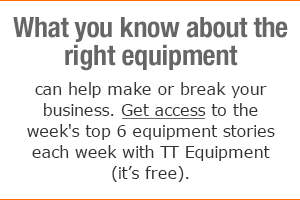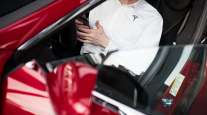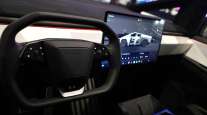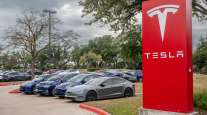This Electric Truck Will Probably Beat Tesla’s to Market

On the evening of Nov. 16, Elon Musk unveiled the latest prop in his Tony Stark cosplay. Tesla Inc.’s all-electric semi rig met all the classic Musk product launch criteria: It looked stunning, had unprecedented performance numbers, included features straight out of science fiction, and would arrive at some unknown date at a too-good-to-be-true price from a still-to-be-built assembly line.
Ten miles from the cramped Los Angeles airport hangar where thousands of Muskovites were swooning, a 25-year-old named Dakota Semler watched the performance on his phone, tossed a piece of sushi into his mouth, and shrugged. Semler, you see, has an all-electric semi of his own, a matte-black curvaceous truck known for now as the ET1. It’s the first vehicle from his startup, Thor Trucks, which hopes to grab a tiny slice of the 940,000-unit-a-year market for semis and go after short-haul trucks, delivery vans, and work vehicles. Like Tesla’s rig, the ET1 is meant to bring cleaner-running transportation to heavy industry without sacrificing performance. And like Tesla’s, it’s a head-turner. “Everyone thinks we’ve built a Transformer,” says Semler, Thor’s chief executive officer.
Semler and his 17 employees must contend with extremely long odds, but dramatic advances in battery technology, electric motors, and control software have made electric trucks more practical. While electric trucks will cost more upfront than diesel guzzlers, Tesla, Thor, and a handful of others suddenly have the range and horsepower to argue that customers will come out ahead in the long term, thanks to lower fuel and maintenance costs. Electric vehicles, of course, also pollute less, a serious consideration as cities and states prepare legislation aimed at phasing out dirtier diesel.
As Semler drives the ET1 around Hollywood, gawkers whip out their phones to take photos. The heavy-duty semi, which has a 22-inch touchscreen on its dashboard and a winged black logo splashed across its grille, uses a beach-ball-size electric motor and a couple of large battery packs to carry as much as 80,000 pounds of cargo, the industry standard for the highest class of truck. When it starts shipping in 2019, the ET1 will have a $150,000 starting price tag and a 300-mile range, meaning it’ll compete with medium-duty delivery trucks.
With a look straight out of spoiled-Malibu-kid central casting, Semler doesn’t scream trucking magnate. He grew up in the family businesses: one, a supplier of military electronics; the other, the Malibu Wines vineyard. “When I was 7, I’d work in shipping and pack boxes at the electronics factory, and then over the summers I’d shovel manure at the vineyard,” he says. By the time he was a teenager, he’d overseen the development of a line of decorative wine barrels and converted the vineyard’s diesel trucks to run on waste vegetable oil. At 21, Semler began running safari tours at Malibu Wines, offering people a chance to sip wine while driving next to zebras, giraffes, and water buffaloes obtained from sanctuaries and private collections.

Angie Smith/Bloomberg News
Managing the dozens of vehicles at the vineyard led Semler to electric trucks. He’d dealt with California’s exacting regulations for diesel emissions and could see more curbs coming, so early last year he started retrofitting a diesel semi rig in the back of his family’s 30,000-square-foot North Hollywood warehouse for electronics equipment. Not far from piles of Vietnam War-era radios and antennas, there’s now a large open space where the Thor team works.
For the moment, the startup is more of a vehicle customizer than a true manufacturer. It rips the diesel motor and related innards out of an existing vehicle and replaces them with an electric motor and batteries. Thor has focused on doing its own battery-pack research and manufacturing to cram hundreds of small lithium ion batteries into a tight, safe container, and its software engineers write applications that maximize the packs’ charging abilities and life spans. Look around the Thor warehouse, and you’ll see UPS-style trucks and extended-body pickups awaiting modification. The goal, according to Semler, is to work on a one-off basis, customizing clients’ fleets per their specifications.
Semler’s enthusiasm is infectious. He’s funded Thor with his own money (he won’t say how much) and hired engineers from places such as Boeing Co., electric-car maker Faraday & Future Inc., and Chinese electrics leader BYD Auto Co. But Thor is trying to become a bespoke electric-vehicle maker at a time when the biggest names and fattest wallets in trucking are pouring money into the market. And given that neither Semler nor his co-founder, Giordano Sordoni, has an engineering background, it seems less like a company than a dream. “There’s a tendency to simplify the truck market and think there will be one winner here,” Semler says. “The reality is that there are all kinds of work trucks, and we’re designing a type of transportation lab to cater to all of these.”
A small team working quickly stands a decent chance of carving out a niche, says Mike Britt, who spent 30 years at United Parcel Service Inc. handling the maintenance of its trucking fleets and working on alternative-fuel vehicles. “The big trucking companies just aren’t quite as nimble,” says Britt, who now runs MG Britt Consulting Inc. “UPS used many small startups to build 200 to 2,000 alternative-fuel vehicles. It’s when you start to ramp above those numbers, and need real production expertise and facilities, that things could get trickier for Thor.”





